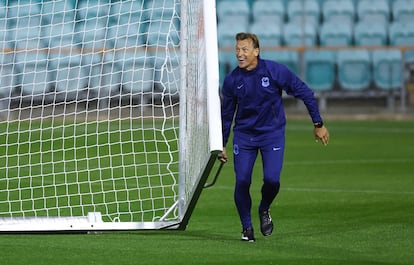Hervé Renard, France’s showman and peacemaker
The experienced coach, who took over Les Bleus months before the World Cup, is hyperactive in the technical area but has restored harmony within the team


It may well be that the character has devoured the person: that Hervé Renard prefers to present himself simply as a soccer coach. But what is certain, after France beat Brazil on Saturday, is that he has set a precedent in the world of soccer by becoming the first coach to win a match at both the Women’s World Cup and the men’s: his Saudi Arabia side beat eventual champions Argentina in the group stage in Qatar. But for France he represents much more: a showman and peacemaker, whose side topped their group to reach the knock-out stages in Australia and New Zealand after a 6-3 victory over a ramshackle Panama.
Renard arrived at the helm of the French national team on the back of a storm that swept aside his predecessor, Corinne Diacre, who was sacked five months before the World Cup after falling out with key players including Wendie Renard, to the point that the veteran defender left the team because she did not endorse the technical work on offer. Following Renard’s decision, other influential figures such as Marie-Antoinette Katoto and Kadidiatou Diani paraded down the resignation catwalk. It was a huge blow for the France Football Federation, which had high hopes of improving on a semi-final run at the 2022 European Championship and a quarterfinal showing at the World Cup on home soil in 2019. Les Bleus had the physicality and talent to aspire to the title. And the challenge was accepted by Renard.
The well-traveled French coach exchanged Saudi Arabia’s rials for Les Bleus on a contract similar to Diacre’s — €400,000 per year to 350,000 for his predecessor, although the bonus for winning the tournament is six times higher, €600,000 compared to €100,000 — and he soon convinced the dissidents to return to the fold: Diani scored a hat-trick again Panama on Wednesday. Although he had the misfortune to lose key players as Katoto, Griedge Mbock, Delphine Cascarino, Amandine Henry, and Oriane Jean-François before the tournament, he did not hesitate: “I’ve been watching women’s soccer since 2014. I have followed the major competitions and the matches of the French national team. I make no secret that I was surprised by my decision. But there is no substitute for major competitions in our profession,” he said.
After being criticized for a draw against Jamaica in France’s opening match, Renard tried to keep things calm and peaceful with fun sessions and teqball tournaments — a mixture of kick volleyball and soccer skills played on a variety of ping-pong table. But when it was time for the match against Brazil, in which France’s qualification for the knock-out rounds was at stake, it was time for the Renard show. The coach recorded himself in the locker room while giving a motivational talk. “Soccer is about being there on the day and I know you’re going to be there. I can’t explain why, but I know,” he said. “There are times when it’s going to be tough, we’re going to have to overcome obstacles. And you are going to be able to overcome them. Free yourself, dare, do it. And then, if it doesn’t work the first time, it might work the second time.”
It was a talk reminiscent of the one he delivered to his Saudi Arabia side in Qatar during half-time against Argentina. “Is that pressing? Messi has the ball in midfield and you’re waiting quietly in defense? You might as well take your phones out and get a picture with him,” Renard rebuked his players. It worked against Argentina, and it worked again against Brazil last weekend, even if during the match Renard quarreled with the opposing bench in the same manner that he complained to the referees for giving too much added time.
But that is the Hervé Renard show, with France now into the knock-out stages at the 2023 World Cup: provocateur and a peacemaker in equal measure.
Sign up for our weekly newsletter to get more English-language news coverage from EL PAÍS USA Edition
Tu suscripción se está usando en otro dispositivo
¿Quieres añadir otro usuario a tu suscripción?
Si continúas leyendo en este dispositivo, no se podrá leer en el otro.
FlechaTu suscripción se está usando en otro dispositivo y solo puedes acceder a EL PAÍS desde un dispositivo a la vez.
Si quieres compartir tu cuenta, cambia tu suscripción a la modalidad Premium, así podrás añadir otro usuario. Cada uno accederá con su propia cuenta de email, lo que os permitirá personalizar vuestra experiencia en EL PAÍS.
¿Tienes una suscripción de empresa? Accede aquí para contratar más cuentas.
En el caso de no saber quién está usando tu cuenta, te recomendamos cambiar tu contraseña aquí.
Si decides continuar compartiendo tu cuenta, este mensaje se mostrará en tu dispositivo y en el de la otra persona que está usando tu cuenta de forma indefinida, afectando a tu experiencia de lectura. Puedes consultar aquí los términos y condiciones de la suscripción digital.








































